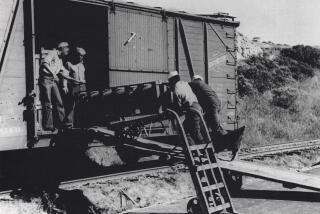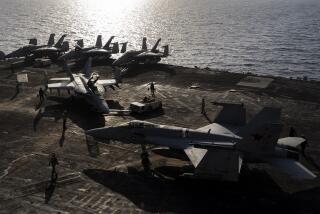Navy Query Ordered; Ship Toll Hits 37
- Share via
WASHINGTON — The death toll on the stricken U.S. frigate Stark rose to 37 today, and the Pentagon ordered an inquiry into why the ship did not defend itself against an Iraqi missile attack.
Defense Secretary Caspar W. Weinberger told a Senate committee “we do not know why” the guided missile frigate, built in 1982 and carrying an array of state-of-the-art electronic warfare systems, did not attempt to protect itself when an Iraqi plane struck in the Persian Gulf.
“That will be one of the first orders of business of the inquiry,” Weinberger said.
Naval Board Probe
He announced that a naval board will arrive in Bahrain on Wednesday to begin its probe.
The crippled 3,585-ton Stark, holed and smoldering, was expected to be towed into Bahrain later today.
At least one French-made Exocet plane-to-ship missile, costing around $300,000, blasted the $200-million ship Sunday night, igniting flash fires in forward compartments. (Stories, Page 10).
Weinberger said 185 of the ship’s crew of more than 220 were fit for duty. At least 37 crewmen had been killed--24 had been identified and 13 were missing, presumed dead.
Among the 37 crew members killed in the attack were two Californians: gunner’s mate James Plonsky, 22, of Van Nuys and torpedo man James Russell Stevens, 27, of Visalia.
In Moscow, the Soviet Union today condemned the U.S. naval presence in the Persian Gulf and called for urgent talks to prevent more attacks on ships in the sensitive waterway.
The Communist Party newspaper Pravda accused Washington of using the war as a pretext for building up its military presence and called for talks to begin immediately “on ensuring the freedom of navigation in the Persian Gulf, the Strait of Hormuz and throughout the Indian Ocean area.”
Policy Reexamination
Senate Democratic and Republican leaders today said the United States must reexamine its military policy in the Persian Gulf, but there were no immediate demands for the superpower to retreat in the face of heavy casualties.
“It is clear that a new look at readiness conditions in the gulf is in order,” Democratic leader Robert Byrd of West Virginia said in a Senate speech.
“We need to continue to protect our friends in the gulf. If we’re going to continue to have a naval presence . . . it is critical that every step be taken to protect our ships.”
Byrd said the United States should reach an understanding with Saudi Arabia about providing air cover in the gulf before approving any new sales of U.S. arms.
More to Read
Sign up for Essential California
The most important California stories and recommendations in your inbox every morning.
You may occasionally receive promotional content from the Los Angeles Times.










